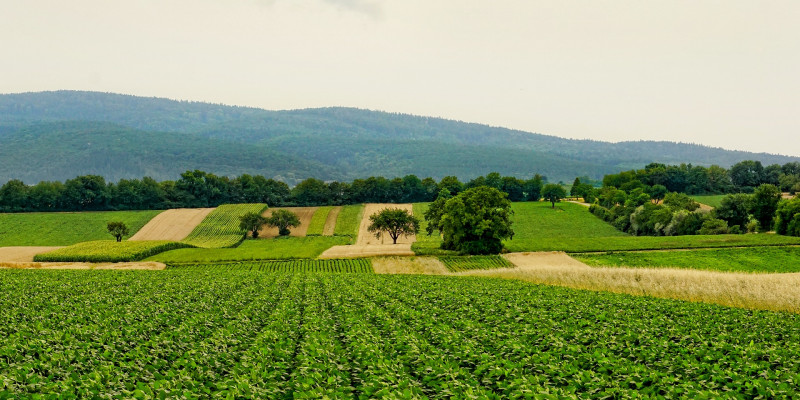Cluster Land
 Click to enlarge
Click to enlargeSource: Schwoaze / pixabay

Measures for the fields of action soil, agriculture, forestry and biological diversity
 Umweltbundesamt
Umweltbundesamt
 Click to enlarge
Click to enlarge
Measures for the fields of action soil, agriculture, forestry and biological diversity
It continues to be a core task of agriculture to provide appropriate nutrition for a growing global population in a sustainable manner. However, farming and forestry are affected particularly by climate change impacts, as are fisheries and aquaculture (as experienced in 2018 and 2019). In response, the Federal Ministry of Food and Agriculture (BMEL) already began in the autumn of 2018 to formulate an adaptation agenda for agriculture, forestry, fisheries and aquaculture; the process involves the Länder administrations, the BMU and departmental research programmes. The agenda is based on DAS guidelines, and shall become an integral part of them hereby.
The adaptation agenda for agriculture, forestry, fisheries and aquaculture was adopted in April 2019 by the conference of agriculture ministers. A programme of action is currently being finalised. This will comprise both actions serving as immediate responses to acute extreme weather events, and actions for long-term adaptation of farming and forestry to changing weather patterns. Five fields of action have been defined: plant production (specialty crops and arable crops), forests, livestock, fisheries and aquaculture, and overarching issues. For each of these fields of action, expert groups have produced catalogues of actions. The overarching issues include research on adapting crops and varieties through breeding activities, actions to preserve and utilise genetic resources, and ways to bring about climate-smart and site-appropriate crop rotations and variety selection.
Climate change can put at risk the very survival of native species. APA III therefore promotes the development of viable, nationwide habitat networking. The aim here is to create opportunities for species and habitat types to persist, and to facilitate geographic adaptation of organisms in the wake of climatic changes. One approach here is to optimise the habitats of climate-sensitive and/or endangered species to improve their resilience and adaptive capacity, e.g. by setting aside sufficiently large areas providing habitat protection functions. The Federal Programme for Biological Diversity implements the National Biodiversity Strategy, the “ecosystem services” funding priority of which explicitly makes provision for actions to safeguard capacity to adapt to climate change.
To gain a better understanding of the changes in and rapid decline of species diversity, the BMBF launched in 2019 its research initiative for species diversity conservation, which is a FONA lighthouse initiative. This will substantially advance biodiversity research, pool relevant research activities, and make a sustained contribution to countering the ongoing loss of biological diversity.
Through a programme securing the extent of and rewetting bogs and fens, it is envisaged that, initially, individual pilot projects for mire soil conservation are to be carried out with federal funding. In addition, under the Climate Action Plan and with EKF funding, actions are planned to substitute peat uses and to establish a mire conservation programme in agriculturally utilised areas.
Furthermore, a climate impact soil monitoring network is to be set up and established as a long-term scheme. The purpose of this mechanism is to record, monitor and document, throughout the territory of Germany, the current status of soils and the changes resulting from climate change. To this end, the network will ensure simplified access to soil-related measurement data for users in academia and administrations, will coordinate and network the activities of measurement system operators and users, and will integrate diverse levels of measurement intensity.
Creating climate-resilient forests in federally owned stands involves the stable, structurally rich and site-appropriate development of mixed forests. Activities here are guided by state-of-the-art research. The Forest Climate Fund (WKF) funding scheme shall be used to implement actions of particular federal interest that serve forest adaptation to climate change and preserve the indispensable contributions that near-natural, structurally rich and species-rich forests make to safeguarding the natural bases of life in the long term. The positive effects in terms of harnessing the energy potential and CO2 reduction potential of forests and timber are to be amplified. In addition, promoting forest adaptation to climate change is to be advanced in the context of the federal/Länder Joint Task for the Improvement of Agricultural Structures and Coastal Protection.